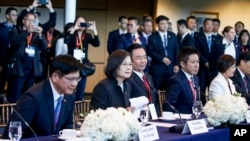U.S. lawmakers dismissed warnings from the Chinese Embassy they should not have met with Taiwan’s president, Tsai Ing-wen, saying Thursday the Chinese Communist Party does not have a veto over congressional meetings.
“By meeting with President Tsai, our bipartisan delegation [led by Speaker Kevin McCarthy] is standing up to the bullies in the CCP,” Representative Mike Gallagher, chairman of the House Select Committee on Strategic Competition with China, told VOA in a statement.
“We will not be intimidated. We support our friends in the free and democratic Taiwan. We're going to keep saying that whenever we have the opportunity and the bipartisan members of the Select Committee on the CCP will turn our word to action this Congress,” Gallagher said.
A bipartisan group of 19 members of Congress were with McCarthy in California, where meetings with Tsai were held Wednesday at the Ronald Regan Presidential Library and Museum in Simi Valley.
Hours earlier, U.S. media outlet Punchbowl News reported some of the lawmakers meeting with Tsai also received emails expressing “China's deep concern and firm opposition to this possible move.”
“The Chinese side strongly opposes any form of official interaction between the U.S. and Taiwan, strongly opposes any visit to the U.S. by the leader of the Taiwan authorities regardless of the rationale or pretext, and strongly opposes all forms of contact of the U.S. officials with the Taiwan authorities,” wrote Li Xiang, identified as a counsellor at the Chinese Embassy, in an email obtained by VOA.
China considers Taiwan a breakaway province. President Tsai has said “external pressure” will not stop the self-ruled island from engaging with the world. Lawmakers said there would be no change in their plans.
“China cannot dictate who members of Congress meet with on U.S. soil. The congressman looks forward to meeting with President Tsai and Speaker McCarthy today,” a spokesperson for Representative John Curtis’s office told VOA.
California Congresswoman Michelle Steel agreed.
“I cannot be threatened by the Chinese Communist Party,” Steel said in a statement to VOA. “The CCP will do anything in order to maintain their control. They are the greatest threat to democracy and will not be allowed to dictate the actions of any American citizen. I am proud to meet with President Tsai again, as I did when I visited Taiwan in December, and reaffirm our support for a free, sovereign democracy.”
The House Select Committee on the Chinese Communist Party told VOA that several, but not all, lawmakers traveling to California for the Wednesday talks reported receiving the embassy email.
The email goes on to say that Tsai’s meeting with McCarthy and other lawmakers violates the “One China” principle, the policy held by the People’s Republic of China that there is only one China and Taiwan is part of it.
“China has no room for compromise on this issue. We urge the U.S. side to refrain from facilitating a meeting between the U.S. lawmakers and Tsai Ing-wen, and stop all forms of official interaction with Taiwan,” the letter continues, warning China will “most likely take necessary and resolute actions in response to the unwanted situation.”
The U.S. State Department maintains that transits by high-level Taiwan authorities are not visits and are private and unofficial. Every Taiwan president has transited the United States, and this is Tsai’s seventh visit since taking office in 2016.
Editor's note: An earlier version of this story gave an incorrect first name for Representative Curtis. VOA regrets the error.




